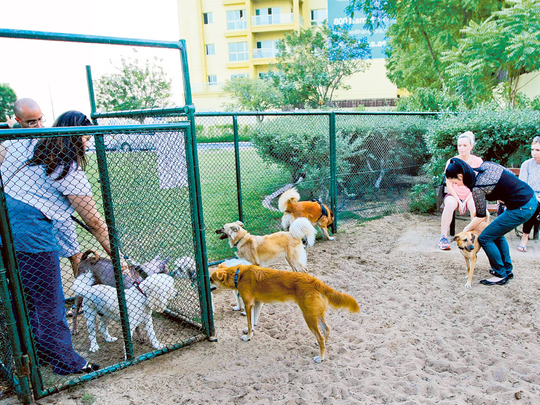
Dubai: The majority of Dubai residents who responded to a Gulf News poll said the emirate has plenty of room for improvement when it comes to being pet-friendly.
With the recent clamour for more public space in Dubai to allow pets in, Gulf News surveyed pet owners and lovers residing in Dubai to assess how pet-friendly the emirate is in terms of meeting the needs of their pets as well as protecting them against abuse.
Gulf News teamed up with animal welfare groups to reach some 750 residents who keep pets, once had pets, or are planning to have pets in the future.
Internationally, various organisations assess the pet-friendliness of European and US cities annually using a set criteria since it is a big consideration for many residents in choosing where to live.
For the Gulf News poll, we asked residents about the policies in the emirate that cover pets, the spaces or areas they are allowed in, the availability of pet groomers and caretakers, and the general attitude of humans to pets.
When asked how pet-friendly Dubai is, one in two respondents or some 53.29 per cent said the emirate is not at all that friendly to their furry friends. Some 41.48 per cent said the emirate is a bit pet-friendly, and only one out of the 750 respondents said Dubai is “very pet-friendly”.
Animal welfare advocates said the results came as no surprise.
Lesley Muncey, chairwoman of Feline Friends, said that in comparison with other cosmopolitan cities, Dubai is below average when it comes to pet-friendliness.
“If you’re in the UK, in the US, or in most cities in Europe, if a cat or a pet is trapped in a tree or somewhere else, the fire brigade would immediately come to their rescue, whereas here I don’t think you’d get the same [response],” Muncey told Gulf News.
Hayley Strifler, founder of the Dubai Senior Dogs Project, gave Dubai a rating of ‘unsatisfactory to poor.’ “But it is getting better because more and more businesses are becoming aware and becoming more pet-friendly,” Strifler told Gulf News.
Based on the responses, here’s a list of the main issues pets and those who keep them face:
1) Space available – public space and living quarters
Dogs are not allowed on public beaches and in parks in the emirate according to Dubai Municipality rules. Most residents live in high-rise buildings and have very limited greenery where pets, especially big dogs, can walk and be with other dogs.
A British expatriate who has two dogs said she spends Dh1,200 monthly to get her dogs to socialise with other dogs twice a week at a local pet park. This is despite having a small garden at home.
“Apart from the money, there is also the time factor to consider. I need to leave the house at least an hour earlier than normal on dog day care days, and don’t get back until about an hour later than I normally would due to traffic. Day care is great for them as they get to run around and socialise with other dogs. However, in an ideal world, there would be an official dog park/beach etc to take them to.”
2) Commercial space
In cities like Paris and New York, pets are allowed in hotels and restaurants which is not the case in Dubai. When asked to rate the number of commercial establishments or areas that allow pets in Dubai, some 85.09 per cent gave an “unsatisfactory rating.”
3) Grooming, medical costs
Muncey said there are those who don’t sterilise their pets, mainly due to high medical costs. Neutering dogs in Dubai could cost between Dh490 and Dh700 while spaying could range between Dh560 and Dh800. In the US, the average cost for neutering from a low-cost clinic is between $45 (Dh165) and $135 (Dh490) depending on the weight of the dog. Spaying usually ranges from about $50 to $175.
If pets aren’t sterilised, there is the problem of unwanted litters that often end up as strays, which compounds the problem of stray animals in the emirate. Muncey said planning and saving for your pets can help. In some instances, connecting with the community and the developer of the area is key as well.
Muncey said: “Feline Friends would like to commend developer, Emaar, for working with us in reducing the number of strays or abandoned pets in their areas by covering the costs of neutering or spaying them.”
4) Travelling
The transient population of residents adds to the burden of stray or abandoned animals because there are those residents who think taking their pets with them abroad is a massive and expensive undertaking.
But just like Muncey’s point above, she stressed that pet owners can save make a monthly saving for their pets to cover future costs of travel. If you can take your important piece of furniture with you, why not your pets?
5) Attitude towards pets
Some 32.84 per cent of respondents said pet owners in Dubai are “quite responsible” while 23.96 per cent believe those with pets are “very irresponsible”. This could be because of the growing number of strays, which animal welfare advocates say is due to irresponsible residents who don’t treat their pets as family members but as property.
In order to be a genuinely pet-friendly city, harsher penalties for people who abuse or neglect their animals are needed, Strifler said.








